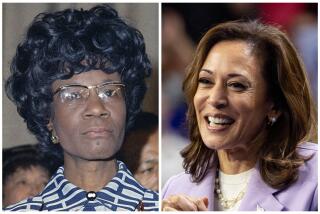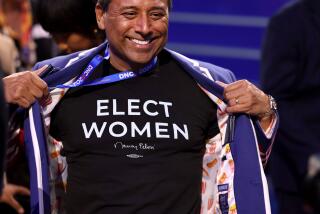The Diana vs. Hillary Conundrum
- Share via
Is there any yardstick, any stretch of the imagination, by which the late Princess of Wales might be considered a better feminist than our own formidable first lady? Is such a thing possible, that a jet-set princess with an eating disorder could be perceived as more liberated than a hard-charging, fiercely articulate Ivy League lawyer?
The question might strike some as silly, even a little diabolical. But these are the two most prominent female icons of our time, and comparing them offers a hard look at contemporary feminism and at how love and ideology don’t always mesh--and at what we tell our daughters about what a fulfilling married life should look like and feel like and what they should put up with and what they shouldn’t.
In her painful, public way, Princess Diana could not, would not do what Hillary Rodham Clinton has done, that is, put up with a philandering mate. A wide-eyed naif when she married, she turned suicidal, we are told, when she discovered the extent to which her husband loved another and had always done so. Amid all that royal-wedding bacchanal, he had pledged his troth falsely.
It was a pomp-and-circumstance canard, a misalliance of major proportions. She loved clothes and rock ‘n’ roll; he loved Camilla Parker-Bowles and retro architecture. She floundered and starved herself and took lovers. He made speeches and looked glum and sneaked off to see his true love. Finally, both went public, a profoundly unroyal and rivetingly unseemly display of accusation and counteraccusation. They finally divorced. He went back into his reserved country-squire self (with Parker-Bowles close by), while Diana plunged into the embrace of an empathetic public, helping rid the world of land mines in her khakis and doing her complicated love-hate dance with the press and paparazzi till her death in that Paris tunnel.
Love her or disdain her, there was something touchingly admirable in Diana’s unhinged inability to live with her husband’s cheating heart. The one thing that came through loud and clear was that Diana could not settle into any overt or tacit marital arrangement. Charles was not going to have her, and Parker-Bowles on the side, no matter how much royal pressure was brought to bear.
What, then, does that say of our own first lady, hanging in through the lurid details of her husband’s indiscretions, the talk of semen stains and hotel-room propositions? We’ve cringed for her, as she has soldiered on, coiffed head held high. We’ve admired her grit, her grace, her dogged silence on the matter of Monica S. Lewinsky et al.--unlike Diana’s teary-eyed public burbling. A silence, we are told, she maintains even with close friends and family.
But it’s impossible not to ask how this happened. How does a strong, capable woman like Hillary Clinton, a purported exemplar of her liberated generation, find herself in this unliberated position of being tethered to a serial adulterer? How in the world can she deal with this?
Various commentators and pundits have suggested that the Clinton marriage is but “a repugnant arrangement,” a cold-eyed partnership of the power-hungry. She married him because she knew he was going places and was willing to tolerate his roving eye for her own ambition. That’s the bottom line.
But the truth is none of us know what really goes on and has gone on in the first marriage--how much love there was and is. Love is always the mystery, how it blooms, what it survives. Just ask Princess Diana, whose fair prince, as it turned out, loved her not a whit. Hillary Clinton, on the other hand, has been quoted as saying Bill is her best friend and has been for more than 25 years. Does that sound like an arrangement?
Even if she knew what a complicated bargain she was making, maybe for Hillary Clinton there was a higher goal, a higher good. Not just to satisfy her ambition, as her critics insist, but something more: a chance to matter, to make a difference. This is an earnest, spiritually inclined achiever from way back, a do-gooder.
Whether you like her politics or not, what’s been clear about Hillary Clinton from the beginning is her drive to be a positive force. What she no doubt realized, at peril, perhaps, to her own self-respect, is that joining up with the charming, equally driven Arkansan way back when improved her chances of doing precisely that--while he, in turn, probably felt the same way. If there’s calculation in that, there is in any relationship or marriage. You don’t sign on unless you think you’re going to be stronger, better, bigger together than apart.
All that said, the sad thing is that Hillary Clinton hasn’t been able to pull it off. She wasn’t able to be the kind of first lady she and many other women hoped she would be. Part of this is due to the nature of the tradition-bound office, part to the intense media scrutiny. No first couple has ever been subjected to the nonstop prying and scrutiny the Clintons have endured, singly and together. There are serious implications for the presidency and the democracy if such an invasive and destructive habit continues. It is part of what killed Princess Diana.
But Hillary Clinton’s immobilization also stems from the overt and tacit bargains she made long ago. From day one she’s had to keep secrets, protect her flank. It made for an early stiffness, a penchant for secrecy, for snappishness (for example, that early campaign remark about cookies and milk) that made her unpopular for a long time and also helped doom the health-care overhaul. That was a disaster: too much secrecy, too much arrogance. It was a mistake in the first place to put her in charge of such a big deal, knowing how tarnished she could be if it failed, just as it was a mistake to suggest that she would be a kind of co-president. That was another unfortunate and unfeminist overreach. She had not been elected for that job.
The irony is that, far from being a big step forward, as many insisted when her husband ran, Hillary Clinton is in some ways a throwback, an anachronism in a world where women like her are running and winning on their own.
Now, we are told, she’s thinking of doing just that, or at least some people are thinking of it for her. Maybe that’s why there’s this strange glow about her even in the midst of the impeachment trial. It seemed eerie at first, a kind of beatific martyr’s mask. But now it makes sense. It’s as if the final shoe has dropped. He’s pushed the envelope so far that she can somehow exhale. She doesn’t have to protect him anymore, beyond her deeply reflexive loyalty and antipathy to his and their enemies. It’s as if she senses her life on the other side, finally, when it’s no longer about Bill Clinton and what office he’s running for and what she has to do for him--change her name, change her hair, defend him and their marriage on national television--what she’d been doing her entire adult life.
But what she’s made clear all along is that it was her choice to do so. This is the opposite of what Princess Diana telegraphed, a free-form, emotional response to the swirling sorrow and public pressure that was her life.
In that sense, you’d have to give the major feminist edge to Hillary Clinton, if you understand feminism to be a woman’s ability to make her own choices, with no external impediment, and to live with them, however painful or complicated the repercussions. To ask feminism to be purer than that, some unalloyed ability of a woman never to be hurt or humiliated, is an unfair standard imposed by the backlash brigade to try to disavow the very notion of feminism and female equality.
No one wants a daughter to marry this way. That’s not so much a matter of feminism as common sense, or maybe both. It’s just too tough, too wounding, just as Princess Diana’s marriage was. But Diana is gone and Hillary Clinton is a survivor. She has another act ahead and, no question, it will be fascinating to see what she makes of it.*
More to Read
The biggest entertainment stories
Get our big stories about Hollywood, film, television, music, arts, culture and more right in your inbox as soon as they publish.
You may occasionally receive promotional content from the Los Angeles Times.










